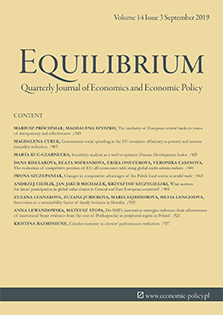Succession as a sustainability factor of family business in Slovakia
Succession as a sustainability factor of family business in Slovakia
Author(s): Zuzana Lušňáková, Zuzana Juríčková, Mária Šajbidorová, Silvia LenčéšováSubject(s): Business Economy / Management, Agriculture, Accounting - Business Administration, Human Resources in Economy
Published by: Instytut Badań Gospodarczych
Keywords: family business; succession; human resources; sustainability;
Summary/Abstract: Research background: The success of family businesses abroad is not measured by profit, but is judged by the number of generations that have successfully mastered the succession process. This is why family businesses in Slovakia should also focus on long-term existence. Succession in a family business must be prepared with sufficient time in advance, as this is one of the most risky moments of its future. Purpose of the article: Successful management of the succession process in family businesses requires several years of preparation in different areas. The aim of this paper is to assess the readiness of Slovak family companies to owner generational change in application of selected factors in ensuring the smooth transmission of family businesses to the younger generation. Methods: The method of research was a questionnaire based on a 5-degree Likert scale, where the respondents expressed the degree of their agreement or disagreement with the particular statement. The questionnaire was filled by sample of 412 respondents — 206 family business owners and their 206 successors (son/ daughter). The statistical relations and correlations between variables were performed by Cronbach alpha, Spearman test, Kruskal-Walis test using EXCEL and SAS Enterprise Guide 7.1. programs. Findings & Value added: Slovak family companies have already passed or they are in the process of preparing or implementing the first generational change. We cannot be compared yet with family companies in Germany, USA or the Nether-lands because these firms are in the process of the fourth generation change in the ownership. The added value of this paper is the identification of deficiencies and reserves that prolong or expel the process of successful company transfer to a young generation. It is related to human capital — the professional competence of the successor and the willingness of the founder to leave, the absence of important business documents, or the effort to cope with the process itself.
Journal: Equilibrium. Quarterly Journal of Economics and Economic Policy
- Issue Year: 14/2019
- Issue No: 3
- Page Range: 503-520
- Page Count: 18
- Language: English

